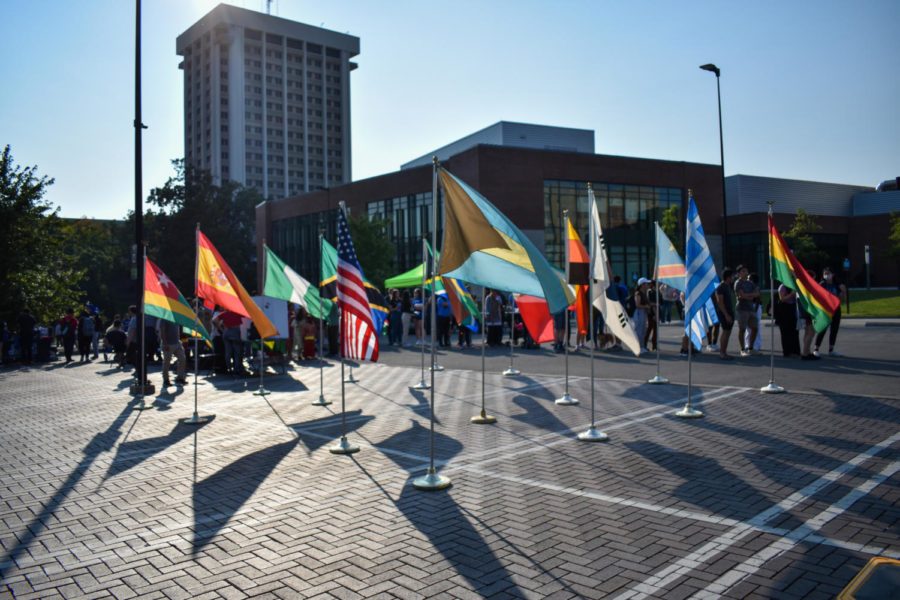Traveling creates new personas
Several flags wave while students stand in line at the Eat Around the World SAB event on Friday, Sept. 16, 2022, at the University of Kentucky in Lexington, Kentucky. Photo by Abbey Cutrer | Staff
January 23, 2023
As I slowly opened the window of the plane, it didn’t take much effort to watch its wing disappear into the clouds while we ascended to maximum altitude, bound for American soil from Brazil.
I found myself sitting there, every muscle aching, with “La La Land” playing on the little screen in front of me. I felt like I was about to face a new script with new lines, gestures and lifestyles.
The simple act of crossing borders leads me to incorporate new personas within myself. During winter break when I returned to Brazil, I knew I wouldn’t be the same, no matter how hard I tried to keep hold of who I am.
It’s not about being a two-faced person; it is about being a human being capable of immersing oneself into a new cultural scenario. It’s as if we’re masses flexible enough to be inserted into new molds with different flags and languages.
According to sociologist Karen Stein, whether on new roads or on new flights, people tend to feel different, since the act of traveling helps us forget, even briefly, our most raw and common version of ourselves.
It is like in our brains, a key is turned that allows us to create a new story from scratch. Pilgrimage. Travel. New airs and, consequently, new personas.
In her book “Getting Away from It All: Vacations and Identity,” Stein makes it even clearer that it is from the moment we pack our bags that the space opens up for us to create a new narrative.
Even today, I remember when I packed my bags for my first trip to the U.S. It looked like my clothes from Brazil wouldn’t fit with my next persona.
Depending on the new story I wanted to tell when arriving in a new country, my clothes also had to adopt this new character.
When I read about it, I immediately thought about how artificial we are. But looking more carefully, I noticed that this is just one character of human nature to be molded.
I believe that we all live in a great spectacle, and traveling is just one of our acts. I even consider it healthy to have the freedom to put on new theatrical masks and face new cultures and new ways of acting and being.
According to neuropsychologist Paul Nussbaum, traveling forces us to de-stimulate our brain to the common and ordinary; it requires us to find comfort in the unknown.
I believe this fact is very relevant, especially for college students.
Studying abroad, internships and research programs in other states or even countries promote open-mindedness and adaptability when encountering unexpected scenarios – qualities that every employer seeks in a good candidate nowadays.
I think it’s crucial to point out that the traveling I’m referring to doesn’t need to require physical locomotion, but a mental one.
I vividly remember when, in my small childhood room, I moved to new countries simply by listening to foreign music, especially Italian, French and English classics.
Perhaps one of life’s most genuine experiences is facing a new script with new lines. Traveling is to wander in scenarios of your own authentic play.


























































































































































